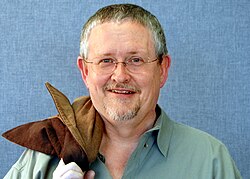
I was reading through some archived posts on Orson Scott Card's website (Hugo and Nebula award-winning author) and came across this one on Themes and an even older one on Plagiarism, Borrowing, Resemblance, and Influence.
From the first one:
If the writer has a preconceived conscious plan for how to present a particular philosophical point, he will start to ignore his own unconscious ideas and will force the characters to act out his little allegory.* The result is: Bad fiction, and therefore an ineffective presentation of the theme. But if the writer shunts aside those preconceived plans, or subverts them deliberately (i.e., make THOSE ideas belong to a character that the audience is supposed to despise), that very humility leads the writer free to tap into his unconscious feelings and ideas about how the world works and what is worth telling tales about.
The reader who gets the story that truthfully and powerfully connects with the real world by way of the writer's unconscious understanding of it WILL find "themes" in the story. But they won't necessarily be themes that the writer was aware of, and will almost never be themes that the writer "put" into the tale.
*(Tolkien also disliked allegory, for the same reason--its artificiality.)
It's definitely worth clicking on through to the full columns. OSC also has some words about "literary writers who try to write about themes":
In a way, this is identical to "hack" work - trying to insert elements that will please a particular kind of audience. Most of the time, when these stories work at all, they do so, not because of the "plan" of the work but in spite of it, because of unconscious concerns that bubble up into the story and give it life despite the deadly story-killing "theme" elements that the writer consciously manipulates.
He explicitly says that the writer can't force themes into his work but has to trust that his unconscious will make the connections as he composes.
This is very similar to what he says about influences, in the other column. The first two-thirds is pretty standard stuff about plagiarism, working with sources, and so on. But when he gets to "derivative" creation and "the anxiety of influence," it really gets interesting:
The problem is that real influence is (or should be) unconscious. That is, because you have read certain writers whose stories have been thoroughly absorbed into your memory, you will unconsciously borrow motifs and ideas from those pivotal works without even realizing you're doing it.
[...]
Some novice writers, having absorbed utterly wrong lessons about what makes good writing, try to be "influenced" by writers they admire. This is not influence, however - it is borrowing. And it's legitimate, though it is customary to acknowledge your conscious borrowings.
If you want to follow in someone's creative footsteps, you can't just deconstruct their work to a list of representative attributes and try to string them together, or you won't get a coherent product. You'll get either something mechanically derivative or a Frankenstein mess.
OSC also notes:
Many writers, however, far from borrowing or seeking to be "influenced," are desperately afraid of inadvertent influence to the point of paranoia. Since every good idea has already been used, getting too anxious about such chance resemblances is a waste of time. Here's my rule: Any idea you really like that absolutely works for your story is your idea, no matter who else might have used it before.
Similarly, in the acknowledgements to Star Wars: Allegiance, Timothy Zahn noted:
Often a writer's mind functions like a giant food processor, taking in thoughts and ideas from everywhere and then mixing and matching the pieces until something new (or at least unrecognizable) emerges. On the rare occasions when we're actually able to trace something directly to its source, it's only right we acknowledge it.
Creative writing is not plug-and-play, it's not Mad Libs, but it is on the subconscious level an exercise in mix-and-match. Not to downplay the obvious importance of conscious composition, but on a subconscious level the creative person's brain combines fragments you've read or seen into a new configuration, and half the time you don't recognize the original ingredients until much later.
Finally, 18th-century author Samuel Johnson said the following:
When a man writes from his own mind, he writes very rapidly. The greatest part of a writer's time is spent in reading, in order to write: a man will turn over half a library to make one book.
Looking back at my own ratio of books written (zero) to libraries overturned, I can say he was definitely on the right track.

No comments:
Post a Comment